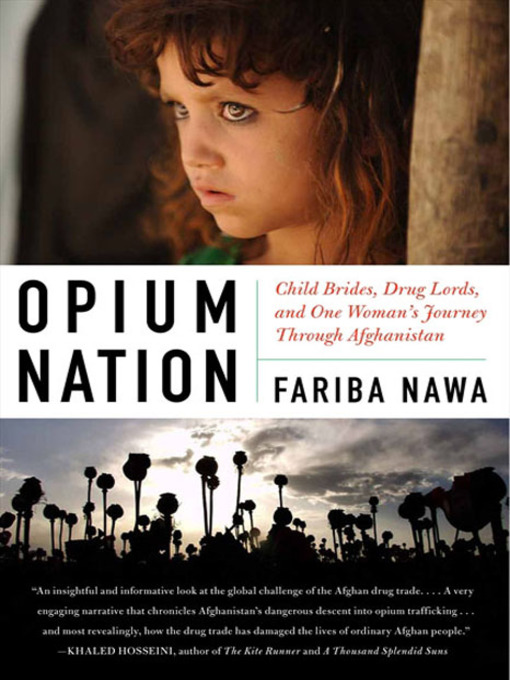Opium Nation
Child Brides, Drug Lords, and One Woman's Journey Through Afghanistan
-
Creators
-
Publisher
-
Release date
November 8, 2011 -
Formats
-
Kindle Book
-
OverDrive Read
- ISBN: 9780062100610
-
EPUB ebook
- ISBN: 9780062100610
- File size: 11093 KB
-
-
Languages
- English
-
Reviews
-
Publisher's Weekly
August 8, 2011
In this powerful and occasionally tragic account, journalist Nawa returns to Afghanistan, which she fled at the age of nine to escape the Soviet occupation. She spends several years traveling the country to interview Afghans involved in the opium trade, “an all-encompassing market that directly affects the daily lives of Afghans in a way that nothing else does.” Tied to Nawa’s journey is a quest to strengthen her Afghan identity and reconcile it with her American self. Although comforted by her ability to “change nationalities, hiding one and bringing forth another,” she doesn’t feel like she belongs fully to either culture. Nawa draws rich, complex portraits of subjects on both sides of the law, people like Farzana and Nanzaneen, a pair of women training to become drug enforcement agents; Mr. Jawan, a kindly former drug smuggler; and Parween, a female poppy farmer whose crops were destroyed by soldiers because she failed to pay off the right people. A chance meeting with Darya, a 12-year-old girl sold into marriage in order to settle her father’s opium debt, propels the book toward its climax: a search for the girl in one of Afghanistan’s most dangerous regions. Nawa’s work is remarkable for its depth, honesty, and commitment to recording women’s stories, even when it means putting her own safety at risk. She writes with passion about the history of her volatile homeland and with cautious optimism about its future. -
Kirkus
September 15, 2011
This fusion of memoir and international reportage paints a disturbing picture of present-day Afghanistan as a tribal narco-state.
Journalist Nawa fled the country with her family as a young girl during the Soviet invasion, and only returned in 2000 as an American citizen working for a Pakistani think tank as an editor and journalist. She then spent several years traveling through the country and reporting on its transformations. Nawa is especially curious about the effects of increased opiate production on Afghan women, and her conclusions are grim: "...the Afghan drug trade provided funding for terrorists and for the Taliban... and [was] strengthening corrupt Afghan government officials whom the United States supported." The author portrays a disordered, cruel society in which a proud culture of intricate traditions has been repeatedly battered by historical conflicts--most recently, the disastrous American response to the Taliban and the explosion of narcotics culture. Afghan social structures seem built around the subjugation of women, and shady drug lords routinely demand marriage to debtors' female children as payment for opium debts, a circumstance equated with virtual slavery. Nawa met one such girl, a spirited and angry 12-year-old named Darya. The author traveled throughout the country in an attempt to understand the surreal circumstances contributing to Darya's plight, talking to rural farmers, anti-narcotics agents and dealers. Essentially, despite brutal risks, the rural poor are drawn to the opium industry due to tribal pressures and for want of better options. Nawa ably captures the tragic complexity of Afghan society and the sheer difficulty of life there. Although the dialogue sometimes feels reconstructed or artificial, her assured narrative clearly stems from in-depth reporting in a risk-laden environment.
Despite Nawa's forceful optimism, the author delivers a troubling indictment of the drug and anti-terror wars visited upon Afghanistan, and of certain reactionary aspects of Afghan culture.
(COPYRIGHT (2011) KIRKUS REVIEWS/NIELSEN BUSINESS MEDIA, INC. ALL RIGHTS RESERVED.)
-
Formats
- Kindle Book
- OverDrive Read
- EPUB ebook
subjects
Languages
- English
Loading
Why is availability limited?
×Availability can change throughout the month based on the library's budget. You can still place a hold on the title, and your hold will be automatically filled as soon as the title is available again.
The Kindle Book format for this title is not supported on:
×Read-along ebook
×The OverDrive Read format of this ebook has professional narration that plays while you read in your browser. Learn more here.


